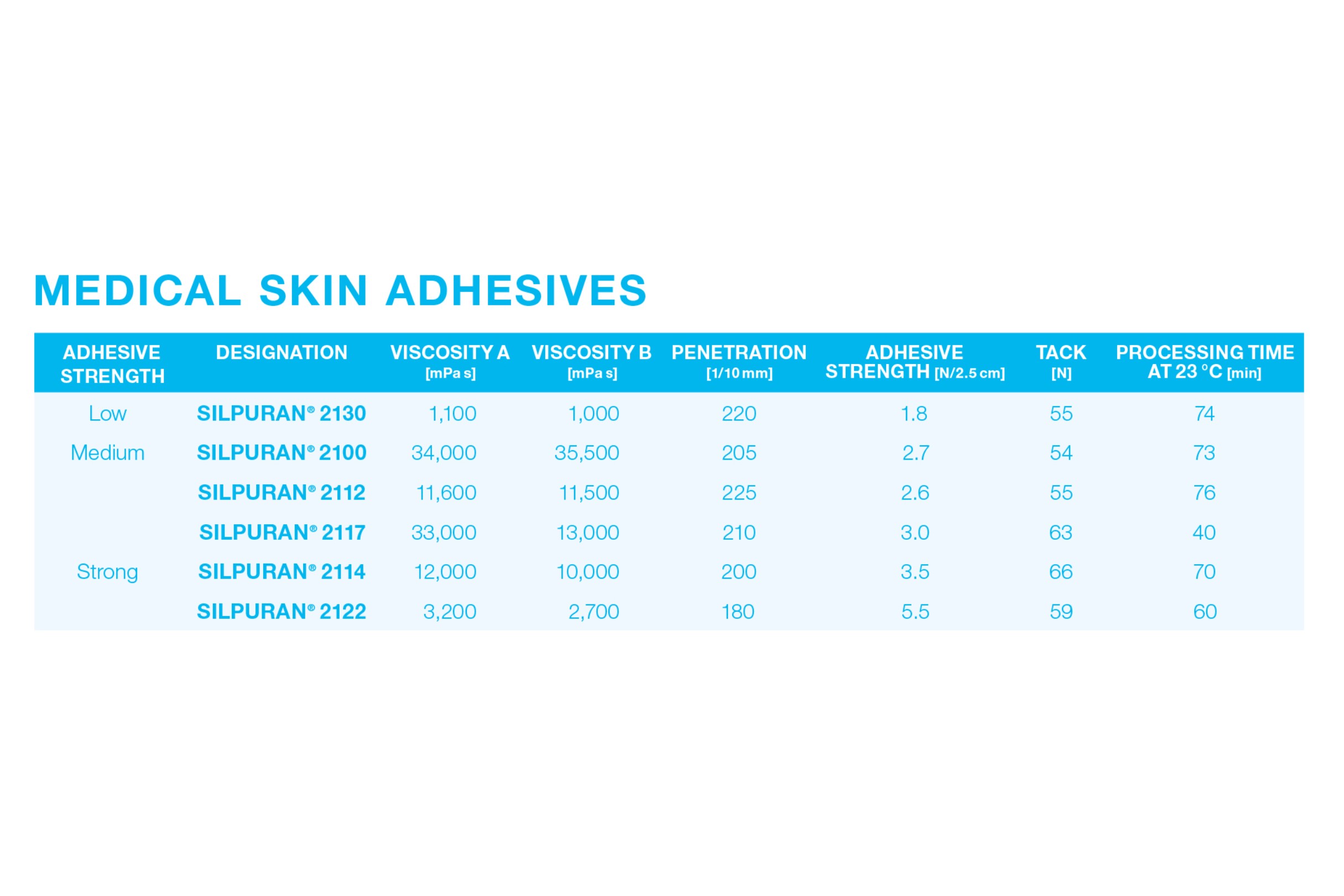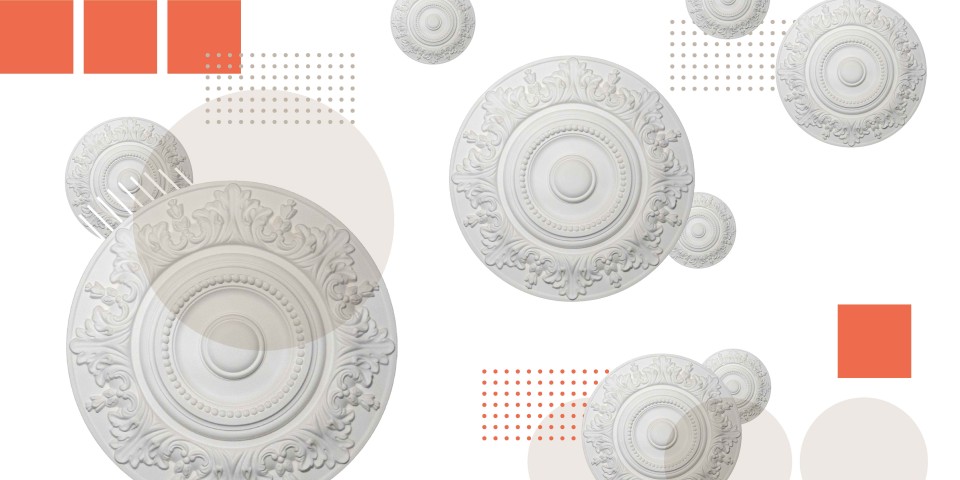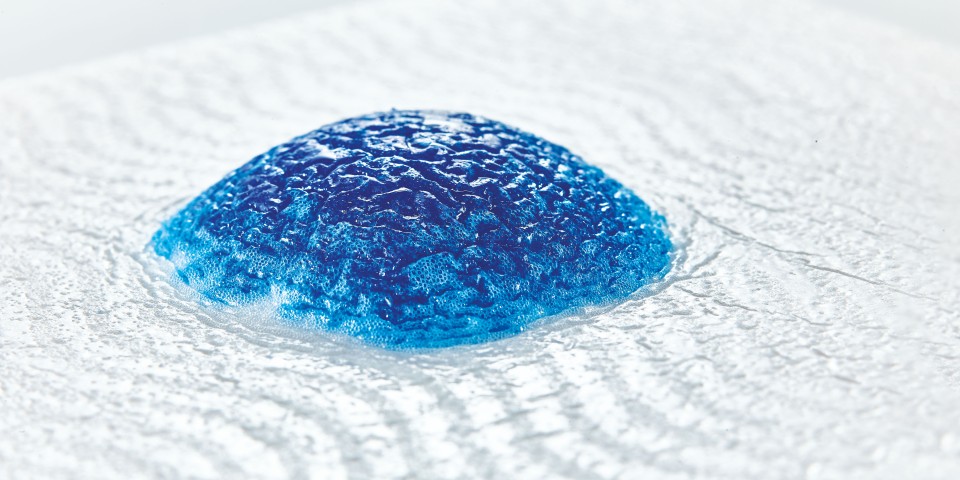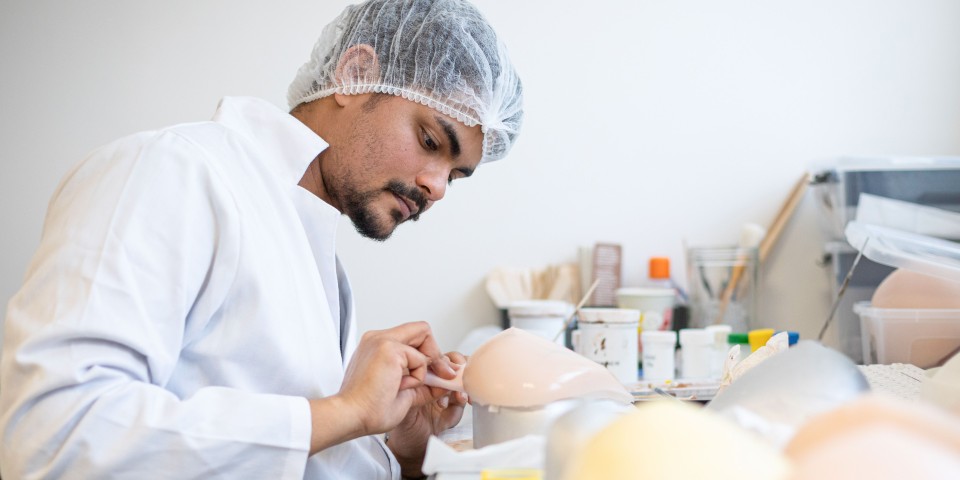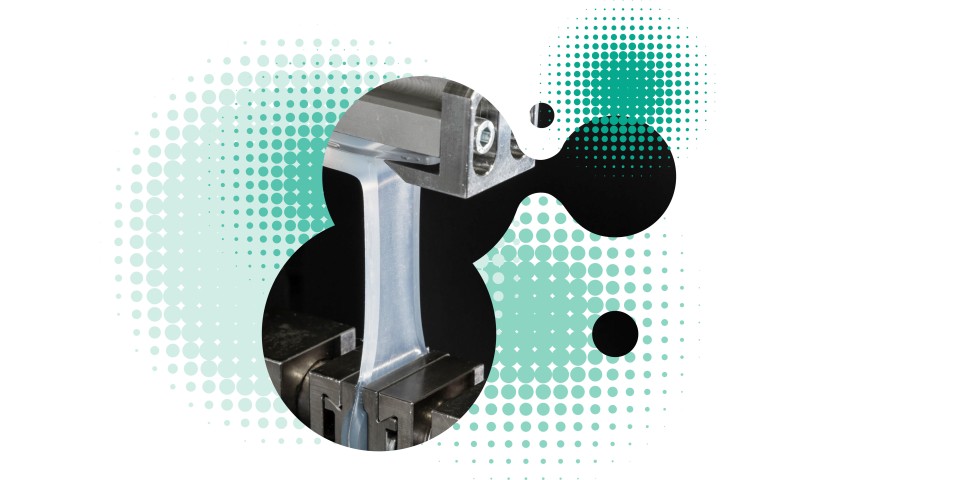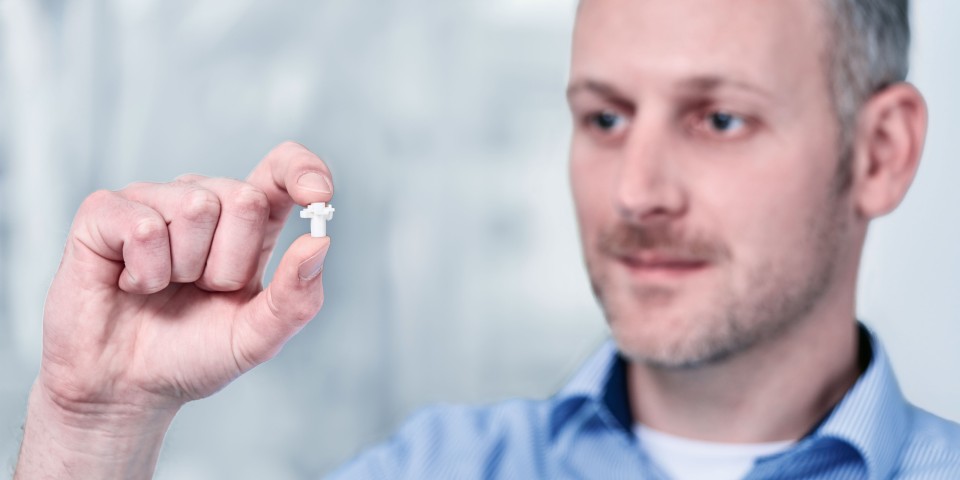
Stomas – Artificial Bowel and Bladder Openings
Modern stoma systems allow patients to do physical exercise like swimming.
Jul 26, 2021 Read time: approx. MinutesMinute
Silicones – Gentle on the Skin
Artificial openings made in the bowel or the bladder – also known as stomas – require constant care. Because the systems employed need to be affixed to the body, it is not uncommon for chronic skin irritation and inflammation to occur. UK-based Trio Healthcare has launched breathable silicone adhesives that greatly enhance stoma patients’ quality of life.
Patients who have undergone bowel or bladder surgery sometimes need a colostomy, ileostomy or urostomy, words that are all derived from the Greek word stoma, meaning mouth or opening. Such artificial openings can be of a temporary nature where a cancer diagnosis or a chronic condition such as Crohn’s disease requires sections of the bladder or bowel to be removed. Often, though, the stoma becomes a permanent intervention for the patient. To ensure that the patient’s movements are not restricted, nonetheless, a waste-collection bag is attached over the stoma and to the body. The bag usually encloses the stoma reliably and absorbs body wastes, but the surrounding skin is nevertheless placed under constant stress.

Reliable prevention and gentle treatment of skin irritation are therefore key to the patient’s well-being. In the ideal scenario, irritation or inflammation would not occur in the first place. This problem has now been addressed by a UK-based medical technology company called Trio Healthcare Ltd. which has come up with a highly innovative development. This company is the first manufacturer to market a complete line of stoma care products with patented, custom-formulated silicone adhesives – based on biocompatible silicone gels from the WACKER SILPURAN® range.
Founded in 2006, Trio Healthcare set out to find alternatives to the acrylic-based hydrocolloids that were used to affix plastic ostomy base plates to the skin at that time. Hydrocolloids adhere well and do a good job of keeping moisture away from the skin. The latter is important because that is the only way to ensure the base plate remains stuck to the skin. “However, we believe that having a product containing feces and urine on your skin is not a hygienic or effective solution to protect against leakage or keeping skin healthy,” says Trio Healthcare in one of its product brochures.
Podcast: A Better Life for Patients with Chronic Wounds

Silicone-based wound dressings made with SILPURAN® from WACKER SILICONES are a much gentler alternative for treating chronic wounds, especially in older people. Thanks to their unique properties, these bandages prevent the dressing from sticking to the wound, allowing them to be removed with significantly less pain. Plus, they also ensure ideal conditions for healing wounds.
Reliable prevention and gentle treatment of skin irritation are therefore key to the patient’s well-being. In the ideal scenario, irritation or inflammation would not occur in the first place. This problem has now been addressed by a UK-based medical technology company called Trio Healthcare Ltd. which has come up with a highly innovative development. This company is the first manufacturer to market a complete line of stoma care products with patented, custom-formulated silicone adhesives – based on biocompatible silicone gels from the WACKER SILPURAN® range.
Founded in 2006, Trio Healthcare set out to find alternatives to the acrylic-based hydrocolloids that were used to affix plastic ostomy base plates to the skin at that time. Hydrocolloids adhere well and do a good job of keeping moisture away from the skin. The latter is important because that is the only way to ensure the base plate remains stuck to the skin. “However, we believe that having a product containing feces and urine on your skin is not a hygienic or effective solution to protect against leakage or keeping skin healthy,” says Trio Healthcare in one of its product brochures.

Competitive sport an option – A snug-fitting and reliably secured stoma system makes even challenging sports activities such as diving possible.
Prone to Injury
Moreover, the hydrocolloid products are not breathable and are difficult to remove. Nathalie Tredwell, sales manager at WACKER UK, describes the consequences. “The skin slowly softens, and becomes prone to injury and damage from body wastes.”
Trio Healthcare’s solution to this was to develop what it calls Sil2™ Breathable Silicone Technology. In this system, the base plate is already coated with a silicone adhesive that affixes the bag securely to the skin – this calls for a silicone that possesses the right adhesive strength. An additional approach is to use silicone rubber rings to secure and protect the stoma. These rings are elastic enough to conform to the colostomy and create a seal, as it were.
“There must be no fluid leakage. All moisture must be kept away from the skin in order to prevent irritation. That was the brief we were given when developing the silicone adhesive,” says Dr. Thomas Gröer, head of an applications laboratory at WACKER SILICONES in Burghausen.
στόμα (stóma)
Stoma is Greek for mouth or orifice and refers to artificial openings for the bowel, stomach and bladder.
The moisture forms because the skin under the plate, which is 12–15 centimeters in diameter, quickly starts to sweat. Silicone has the advantage of being both water-repellent and permeable to water vapor.
The silicone grades employed are two-component, colorless and transparent gels that crosslink via a platinum-catalyzed addition reaction to form soft, highly flexible materials that are nevertheless elastic, with a gelatinous consistency. Together with the low surface energy that is typical of silicones, their compliance ensures that a bond develops between the crosslinked gel and skin, while the elasticity allows the adhesive layer to be peeled off easily, leaving no residues.

Dr. Thomas Gröer, a WACKER chemist, inspecting the transparency of a silicone adhesive.
“No ostomate or stoma patient should be left having to deal with severe skin irritation. That is the aim of our research and product development work.”
Lloyd Pearce, CEO of Trio Healthcare

Elderly patients often have relatively sensitive skin. So if they wear a stoma, they are more susceptible to chronic injuries.
Genuinely Challenging
“Developing these adhesives proved genuinely challenging,” says WACKER UK’s Tredwell, who received an inquiry from Trio Healthcare in the mid-2010s about alternatives to the acrylic-based hydrocolloid pastes in use up to then. She forwarded the medical technology manufacturer’s specifications to WACKER’s technical service team in Burghausen, which set about developing silicone gels of the requisite adhesive strength for the customer.
The products sold by Trio Healthcare, which are based on the medical-grade silicone gels provided by WACKER, have a water-repellent surface, but are permeable to water vapor and gases. In other words, they allow the skin to “breathe.” They thus prevent sores or inflammation from generally forming in the first place. Even if skin irritation should occur, the silicone gels create the perfect healing environment because they let the moisture pass through.
There are 22 countries
in which Trio Healthcare products are available so far. Their considerable adhesive strength is due to medical silicone gels from WACKER.
And the silicone’s high adhesive strength makes the base plates adhere safely and tightly to the skin without irritating it. Added to which, the adhesives can be removed painlessly in one piece and with less skin trauma. They don’t leave any residues behind either because, unlike competing materials, silicones do not dissolve in the presence of bodily excretions.
This improves the quality of life of stoma patients immensely. For Lloyd Pearce, CEO of Trio Healthcare, finding new solutions for stoma care was a personal mission, with a member of his own family affected. “One-half of all stoma patients suffer from skin conditions and irritated skin. I wanted to do something about that.”
His company’s products are now available in 22 countries. The CEO of Trio Healthcare is convinced that there is plenty of untapped further potential: “We won’t stop researching and trying out new things,” says Pearce. “No ostomate or stoma patient should be left having to deal with severe skin irritation.”
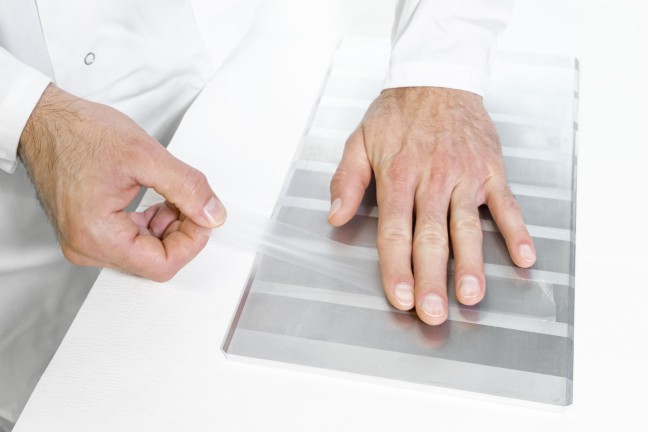
Test strips being prepared in a WACKER applications lab to determine the adhesive strength of various silicone adhesives.
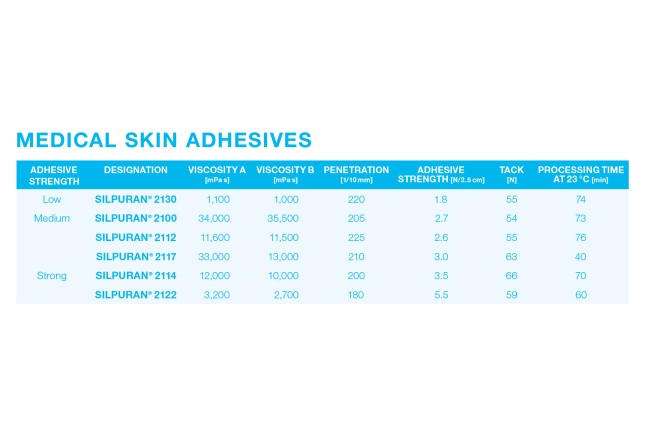
SILPURAN®
The use of skin-friendly silicone adhesives in medical applications is by no means exhausted. “There are still lots of opportunities,” says Thomas Gröer. Silicones are suitable for anything humans attach to their bodies: insulin pumps, EEG sensors, position sensors for dementia patients – even wearables are now affixed using silicone, he explains. “There is still plenty for us to do.”
Mrs. Nathalie Tredwell
Industry Manager
Construction Solutions
+44 1344 401-689
nathalie.tredwell@wacker.com





